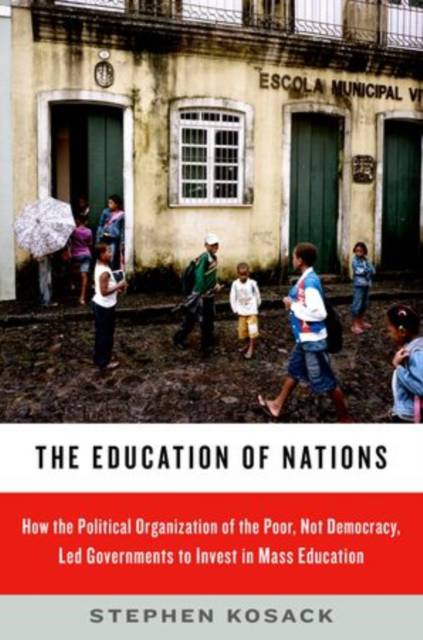
- Afhalen na 1 uur in een winkel met voorraad
- Gratis thuislevering in België vanaf € 30
- Ruim aanbod met 7 miljoen producten
- Afhalen na 1 uur in een winkel met voorraad
- Gratis thuislevering in België vanaf € 30
- Ruim aanbod met 7 miljoen producten
Zoeken
The Education of Nations
How the Political Organization of the Poor, Not Democracy, Led Governments to Invest in Mass Education
Stephen Kosack
Paperback | Engels
€ 47,95
+ 95 punten
Omschrijving
Mass education is vital to sustainable development, particularly in the information age. In The Education of Nations, Stephen Kosack provides a framework for understanding when a government will invest in quality mass education or concentrate on higher education restricted to elites. Drawing on detailed evidence from more than five decades in Taiwan, Ghana, and Brazil - three countries with little in common - Kosack demonstrates that two conditions lead developing nations to invest in mass education. The first of these is an economy in which employers face a shortage of skilled labor that they cannot meet with outsourcing or by hiring foreign workers; the second, and more common, is a government engaging in "political entrepreneurship of the poor" - developing organizational structures that allow poor citizens to act collectively to support the government. In bringing these conditions to light, The Education of Nations provides a method to explain not only how governments try to
distribute educational opportunity, but also the implications for a range of key features of actual education systems, from the relative conditions of schools to the availability of financial aid. In an era when much of a country's success depends on its education, this book explains why governments adopt particular education policies and the political and economic changes that would lead to different ones.
distribute educational opportunity, but also the implications for a range of key features of actual education systems, from the relative conditions of schools to the availability of financial aid. In an era when much of a country's success depends on its education, this book explains why governments adopt particular education policies and the political and economic changes that would lead to different ones.
Specificaties
Betrokkenen
- Auteur(s):
- Uitgeverij:
Inhoud
- Aantal bladzijden:
- 384
- Taal:
- Engels
Eigenschappen
- Productcode (EAN):
- 9780199841677
- Verschijningsdatum:
- 25/07/2012
- Uitvoering:
- Paperback
- Formaat:
- Trade paperback (VS)
- Afmetingen:
- 234 mm x 155 mm
- Gewicht:
- 498 g

Alleen bij Standaard Boekhandel
+ 95 punten op je klantenkaart van Standaard Boekhandel
Beoordelingen
We publiceren alleen reviews die voldoen aan de voorwaarden voor reviews. Bekijk onze voorwaarden voor reviews.











